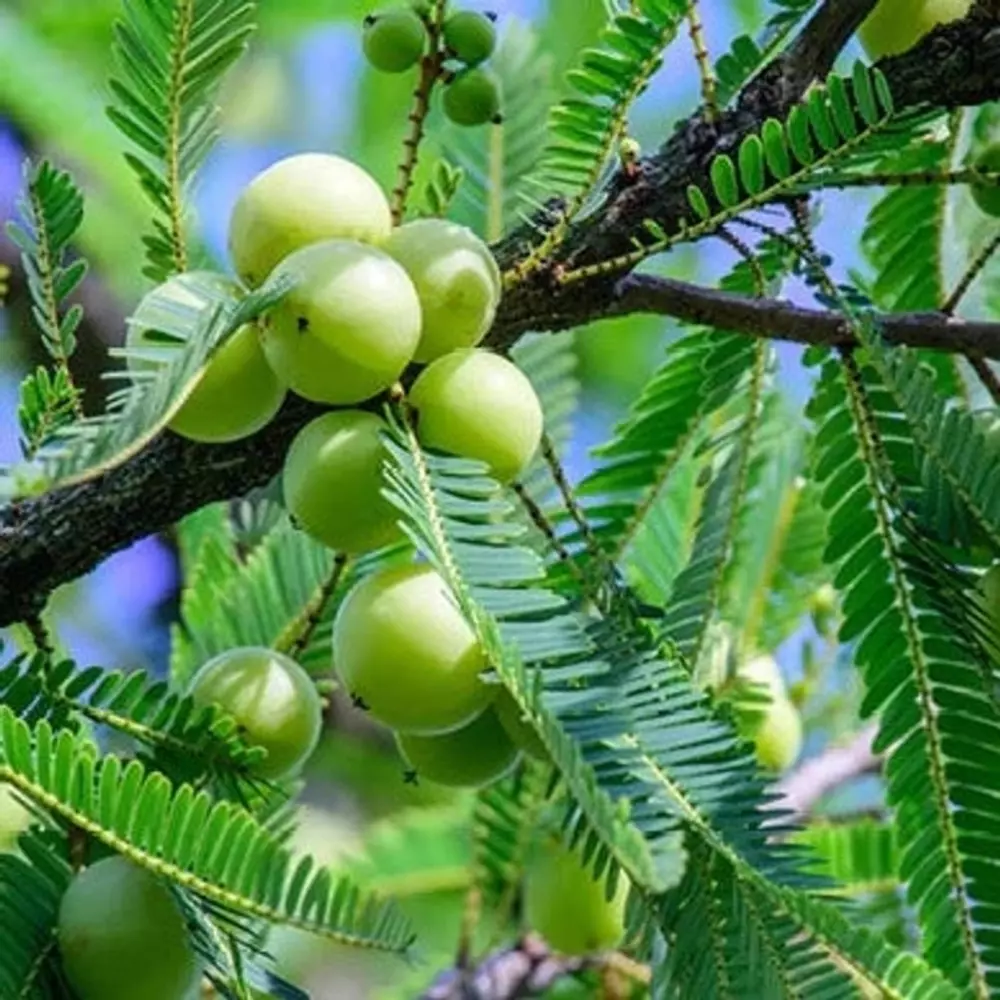Amla, also known as Indian Gooseberry (scientific name: Phyllanthus emblica or Emblica officinalis), is a small to medium-sized deciduous tree that is native to India and other parts of Southeast Asia. It is highly valued in traditional Indian medicine, particularly in Ayurveda, due to its rich nutritional profile and numerous health benefits.
Description:
- Appearance: The Amla tree typically grows to a height of 8–18 meters (26–60 feet). It has a crooked trunk and spreading branches, with light gray bark that often peels in thin flakes.
- Leaves: The leaves are small, simple, and closely set along slender branchlets, giving the appearance of a pinnate (feathery) leaf structure. They are light green and resemble the leaves of a tamarind tree.
- Flowers: The tree produces small, greenish-yellow flowers, which are inconspicuous and bloom in clusters during the spring.
- Fruits: The fruit of the Amla tree is spherical, light green, and about 2–3 centimeters (0.8–1.2 inches) in diameter. The fruit has a smooth, hard skin with six vertical stripes or furrows. It is known for its sour, astringent taste, although it becomes slightly sweet as it ripens. The fruit is typically harvested in the autumn season.
Nutritional Content:
Amla is renowned for its high vitamin C content, which is significantly more than that of an orange. It also contains various other nutrients, including:
- Vitamins: Vitamin A, B-complex vitamins, and Vitamin E.
- Minerals: Calcium, iron, phosphorus, and chromium.
- Antioxidants: Amla is rich in polyphenols, including flavonoids and tannins, which have potent antioxidant properties.
Health Benefits:
- Immune System Support: Due to its high vitamin C content and antioxidant properties, Amla is known to boost the immune system and help the body fight infections.
- Digestive Health: Amla is used traditionally to improve digestion, reduce acidity, and treat gastrointestinal disorders like constipation. It is also a natural laxative.
- Skin and Hair Health: Amla is widely used in Ayurvedic treatments for skin and hair care. It is believed to improve skin tone, reduce wrinkles, and promote healthy hair growth. Amla oil is a popular hair treatment to prevent hair loss and dandruff.
- Heart Health: Regular consumption of Amla is associated with reduced cholesterol levels, improved heart function, and better blood circulation, thereby supporting cardiovascular health.
- Diabetes Management: Amla is believed to help regulate blood sugar levels and is often recommended as a dietary supplement for people with diabetes.
- Anti-inflammatory Properties: The fruit has anti-inflammatory effects, which can help reduce symptoms of chronic conditions like arthritis.
Culinary Uses:
- Fresh Fruit: Amla can be eaten fresh, though its sour taste may be intense for some. It is often consumed with a sprinkle of salt or chili powder.
- Juice: Amla juice is a popular health tonic, often consumed daily for its numerous benefits.
- Preserves and Pickles: Amla is commonly used to make preserves, such as murabba (a sweetened fruit preserve), and pickles, which are popular in Indian cuisine.
- Powder: Dried and powdered Amla is often used in dietary supplements, as well as in traditional recipes for both culinary and medicinal purposes.
Cultural and Medicinal Significance:
- Ayurveda: In Ayurvedic medicine, Amla is considered a Rasayana, which means it is a rejuvenating herb that promotes longevity, boosts vitality, and balances all three doshas (Vata, Pitta, and Kapha). It is a key ingredient in many Ayurvedic formulations, including the famous tonic Chyawanprash.
- Cultural Symbolism: Amla has been revered in Indian culture for centuries and is often associated with good health and longevity. It is also mentioned in various ancient texts and is considered sacred in some traditions.
Environmental Importance:
- Soil Conservation: The Amla tree is often planted in reforestation projects because it is hardy, drought-resistant, and helps prevent soil erosion.
- Wildlife Support: The tree provides food and habitat for various birds and animals.
Amla, or Indian Gooseberry, is a powerhouse of nutrients and medicinal properties. It plays a significant role in traditional medicine, cuisine, and culture, particularly in India, and is valued for its numerous health benefits and versatility.







Reviews
There are no reviews yet.